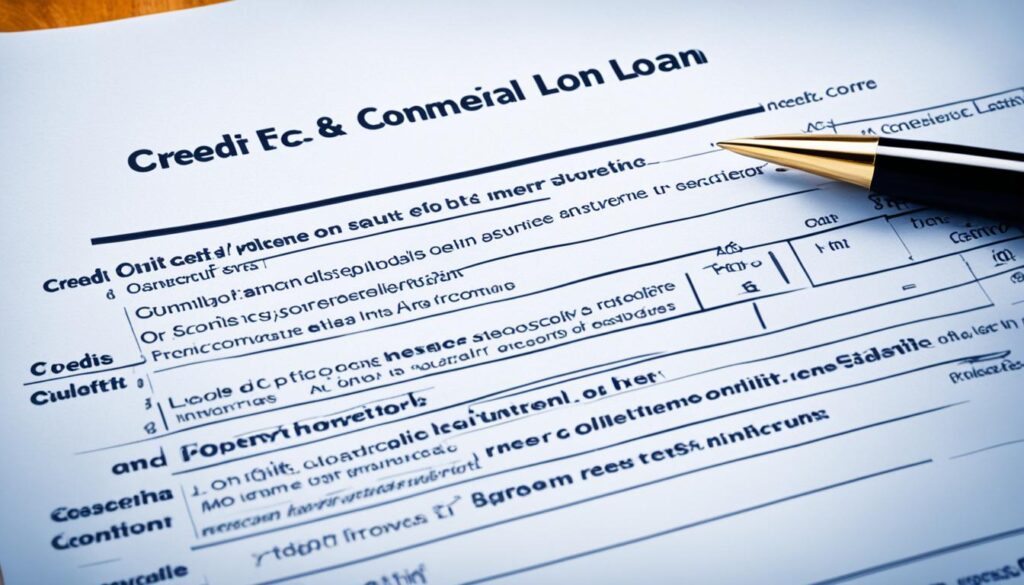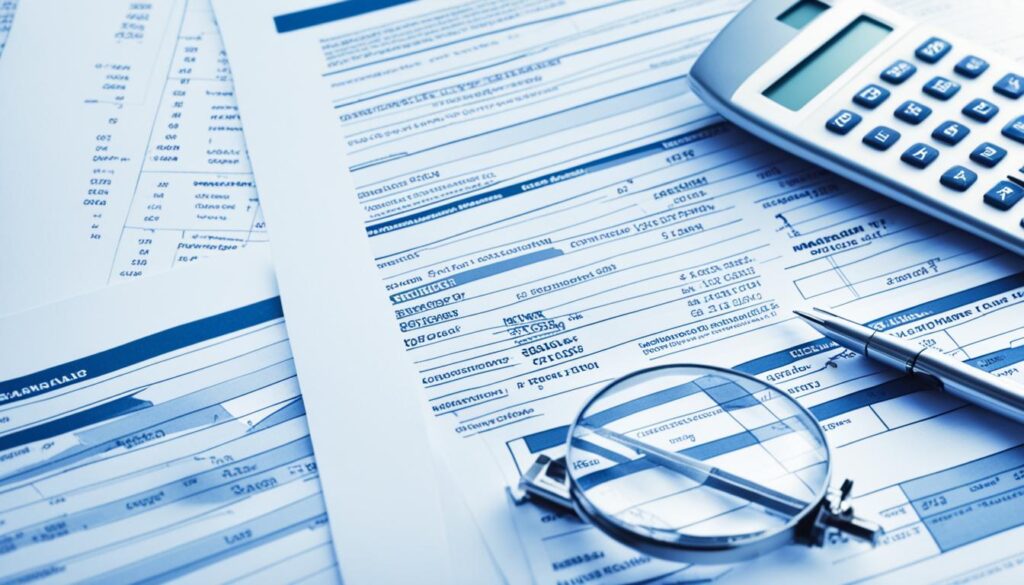Finding the right commercial loan is key for businesses wanting to grow or buy what they need. Whether it’s for new equipment, real estate, or just to cover costs, picking the right loan can be hard. This guide will walk you through the important steps to find a loan that fits your business’s needs and goals.
Key Takeaways
- Understand the differences between commercial loans and business loans to choose the appropriate financing solution.
- Determine your funding requirements and establish a clear purpose for the loan.
- Explore the various types of commercial loans, including equipment financing, commercial auto loans, and commercial bridge loans.
- Familiarize yourself with the qualification criteria, such as credit score, time in business, and annual revenue.
- Consider factors like interest rates, repayment terms, and collateral requirements to select the most favorable commercial loan option.
Understanding Commercial Loans
Commercial loans and business loans are often used the same way, but they have key differences. A commercial loan definition is for bigger businesses. It’s a debt-based financing for large companies. On the other hand, business loans or small-business loans are for smaller companies.
What is a Commercial Loan?
A commercial loan helps businesses pay for things like buying equipment or real estate. Companies borrow money from lenders like banks or credit unions. They then pay back the loan with interest over time.
Commercial Loans vs. Business Loans
- Loan Amounts: Commercial loans are for bigger amounts than business loans.
- Qualification Requirements: Getting a commercial loan is harder. You need a high credit score, a long business history, and strong finances.
- Types of Commercial Loans: There are different kinds of commercial loans, like equipment financing and commercial auto loans. These are not the same as small business loans.
Knowing the difference between commercial loan vs. business loan helps businesses pick the right financing. This is key to meeting their goals and needs.
Determining Your Funding Needs
Before applying for a commercial loan, it’s key to look closely at your business’s business financing needs. Think about why you need the loan – is it for covering a gap in revenue, a one-time expense, or to help grow your business? It’s important to figure out a realistic commercial loan amount that covers your needs and includes a 10% buffer for surprises.
Knowing your commercial loan purpose helps you pick the right commercial loan and borrow the right amount. By clearly defining your business financing needs, you can make a smart choice and get the funding you need to reach your goals.
| Financing Need | Recommended Loan Amount |
|---|---|
| Covering Revenue Shortfall | 3-6 months’ worth of operating expenses |
| Financing One-Time Expense | 110% of the estimated cost of the expense |
| Supporting Growth Initiative | Varies based on the specific project, but should include a buffer of at least 10% |
The table above gives a basic guide for figuring out the right commercial loan amount based on your business financing needs and commercial loan purpose. But remember, these are just suggestions. Your situation might need a different approach.
“Securing the right commercial loan can make all the difference in your business’s growth and success. Take the time to carefully assess your funding needs to ensure you get the support you need.”
By understanding your business financing needs, commercial loan amount, and commercial loan purpose, you can make a well-informed decision. This way, you can pick the right commercial loan for your business’s specific needs.
Types of Commercial Loans

Financing your business comes with many options, each suited for different needs. Knowing these options helps you find the right one for your company’s financial goals.
Equipment Financing
Equipment financing loans are great for businesses buying big or special equipment. This could be machinery, vehicles, or technology. These loans look at the equipment’s value, not just your credit score. This makes them a good choice for companies with little collateral or credit history.
Commercial Auto Loans
Commercial auto loans help buy vehicles like vans, trucks, or other business-use cars. They have better terms than personal loans. This lets businesses get the vehicles they need to work well.
Commercial Bridge Loans
Commercial bridge loans offer short-term financing, often for commercial real estate deals. They cover the short wait until a long-term loan is found. These loans help businesses grab quick opportunities or get through cash flow problems.
Commercial Hard Money Loans
Commercial hard money loans look at the property’s value, not your credit score or income. This makes them a good choice for businesses that can’t get traditional loans.
Understanding the different commercial loans helps businesses make smart choices. Whether it’s equipment financing, commercial auto loans, commercial bridge loans, or commercial hard money loans, you can pick the best one for your needs.
Sources of Commercial Loans

Businesses have many options for getting commercial loans. Each type has its own benefits. From traditional bank loans to online lenders, there’s something for every business looking to grow.
Banks and Credit Unions
Banks and credit unions offer loans with the lowest interest rates. They’re great for businesses with good credit and a solid history. But, they want businesses to have been around for at least two years and have a strong financial record.
U.S. Small Business Administration
The U.S. Small Business Administration (SBA) helps businesses get loans through partnerships with lenders. They offer loans like the SBA 7(a) and 504 programs. These loans have lower interest rates and longer payback times. They’re perfect for businesses that can’t get traditional bank loans.
Online Lenders
Online lenders are a quick and easy option. They offer fast approval and flexible rules. Even though they might have higher interest rates, they’re great for businesses needing quick cash.
Nonprofit Lenders
Nonprofit lenders focus on helping local businesses, especially those that can’t get traditional loans. They offer various loans and business support. This includes training and coaching to help entrepreneurs succeed.
When choosing a commercial loan, businesses should think about their funding needs, credit score, and goals. This will help them pick the best loan source for their situation.
Qualification Requirements

When applying for a commercial loan, lenders look at several key factors. They check the business’s business credit score, time in business, and annual revenue.
Credit Score
A high business credit score, usually in the mid-to-high 700s, is key. Lenders see a high score as a sign of good financial handling. It also means a lower risk of not paying back the loan.
Time in Business
Businesses that have been around for at least two years have an edge. Lenders like to work with companies that have shown they can last. They want to see a history of success.
Annual Revenue
Lenders also look at the annual revenue of the business. They want to see an income between $50,000 and $250,000. This shows the business can handle the loan payments.
Online lenders might be more flexible with their commercial loan requirements. But, banks and the U.S. Small Business Administration (SBA) have stricter rules. Knowing these requirements can help businesses make a stronger application. This can improve their chances of getting the loan they need.
| Qualification Factor | Typical Requirement |
|---|---|
| Business Credit Score | Mid-to-high 700s |
| Time in Business | At least 2 years |
| Annual Revenue | $50,000 – $250,000 |
Commercial Loan
A commercial loan helps businesses fund various expenses like buying equipment, real estate, or covering daily costs. These loans can be term loans or lines of credit. Term loans give a lump sum upfront, while lines of credit let businesses use funds as needed.
Commercial loans have different terms like the amount, interest rate, and repayment schedule. These depend on the lender, loan type, and the borrower’s situation. Businesses looking for commercial loans, business financing, or small business loans should think about their needs and compare options to find the right one.
| Loan Type | Purpose | Key Considerations |
|---|---|---|
| Term Loan | Financing for a specific purchase or project | Requires collateral, fixed repayment terms, typically higher interest rates than personal loans |
| Line of Credit | Flexible access to funds for working capital, inventory, or other business expenses | Revolving credit, variable interest rates, often secured by business assets |
| Equipment Financing | Purchasing or leasing equipment for the business | Typically secured by the equipment being financed, may offer tax benefits |
When looking at commercial loan options, businesses should think about interest rates, repayment terms, and what collateral is needed. They should also consider personal guarantees to pick the financing that fits their goals and finances.
Factors to Consider

When looking at commercial loan options, there are several important factors to think about. These include commercial loan interest rates, repayment terms, and collateral requirements. Each of these can greatly affect the loan’s cost and if it’s feasible.
Interest Rates and APR
The interest rate and APR are key parts that affect how much you’ll pay back. Lower rates mean you pay less over time. It’s smart to look at different lenders to find the best commercial loan interest rates for you.
Repayment Terms
Commercial loan repayment terms can vary from 3 months to 10 years. The term you choose affects your monthly payments and the total interest. Think about your cash flow and financial plans to pick the best term.
Collateral and Personal Guarantees
Many commercial loans need you to offer collateral, like property or equipment, as security. Lenders might also ask for a personal guarantee, which means they could go after your personal stuff if your business can’t pay. It’s important to know these details when choosing a commercial loan.
By looking at these key factors, businesses can find the commercial loan that meets their needs and goals.
Application Process
Applying for a commercial loan is a key step for businesses looking for funding. It doesn’t matter if you need an equipment loan, a commercial auto loan, or another type of financing. Knowing what you need and when can make a big difference in getting your loan approved.
You’ll need to send in a bunch of financial documents when you apply. This includes things like your personal and business bank statements, tax returns, and financial statements. Lenders also want to know about your debts and the reason for the commercial loan. They’ll ask about any collateral you plan to offer too.
- Collect all the commercial loan documentation you need, like financial statements and tax returns.
- Fill out the commercial loan application form with details about your business, the loan’s purpose, and what you need financially.
- Get ready for a detailed review. This might include credit checks, checking your assets, and looking at your business’s finances.
- Remember, the commercial loan approval process can take a while. It can be as quick as a day or as long as several weeks, depending on the lender and your financial situation.
| Loan Requirement | Description |
|---|---|
| Credit Score | Lenders usually want a credit score of at least 680 to approve a commercial loan. |
| Time in Business | Lenders like businesses that have been around for at least 2 years. But, they might consider newer companies too. |
| Annual Revenue | Lenders check your business’s yearly income to see if you can pay back the loan. They often look for a minimum of $250,000 to $1 million in revenue. |
Understanding the commercial loan application process and what documents you need can really help your business. It can make it more likely that you’ll get the financing you need to grow and succeed.
Alternatives to Commercial Loans
Commercial loans are great for many businesses, but there are other options too. These alternatives offer flexible funding that suits small and medium-sized businesses well.
Short-Term Loans
Short-term loans or lines of credit from online lenders give quick cash access. They help with cash flow or daily costs. These are quicker than traditional loans but might have higher interest rates.
Small Business Grants
Small business grants don’t need to be paid back. They come from government agencies and private groups. These grants can be a big help for businesses wanting to grow or start new projects without debt.
Business Credit Cards
Business credit cards are another option instead of loans. They let businesses buy things and pay over time. They have lower credit limits than some loans but are easy and flexible for managing cash flow.
| Financing Option | Pros | Cons |
|---|---|---|
| Short-Term Loans |
|
|
| Small Business Grants |
|
|
| Business Credit Cards |
|
|
Looking into commercial loan alternatives like short-term business loans, small business grants, and business credit cards can help businesses find the right financing. This way, they can meet their specific needs and goals.
Also Read: Can Debt Consolidation Help Reduce My Monthly Payments?
Conclusion
Choosing the right commercial loan for your business is crucial. You need to look at your funding needs, financial situation, and the loan options out there. Knowing about the commercial loan world helps you make a smart choice that fits your business goals and helps your company grow.
Maybe you need money for equipment, real estate, vehicles, or just to keep your business running. Look at the business financing options from banks, the U.S. Small Business Administration, online lenders, and nonprofits. Think about things like interest rates, repayment plans, what you need to offer as collateral, and personal guarantees. This way, you can find the commercial loan that gives you the capital you need to move forward.
The commercial loan process might seem tough, but if you know what you need and what’s out there, you can make a confident choice. By looking at all the business financing options and picking the right commercial loan, you can get the resources you need. This will help you reach your business goals and take your company to new heights.
FAQs
Q: How do I know if I need a commercial loan for my business?
A: If you are looking to expand your business, purchase commercial real estate, or need funds for working capital, you may need a commercial loan.
Q: What is the process of applying for a commercial loan?
A: The process of applying for a commercial loan involves submitting a loan application, providing required documents such as financial statements, and going through credit approval.
Q: What are the rates and fees associated with commercial loans?
A: Rates and fees for commercial loans vary depending on the lender, loan amount, term, and the borrower’s creditworthiness.
Q: Do commercial loans require collateral?
A: Yes, most commercial loans require collateral such as the commercial property being financed to secure the loan.
Q: How does the commercial loan repayment work?
A: Commercial loan repayment typically involves monthly payments that consist of both principal and interest over the loan term.
Q: What is the difference between a commercial loan and a business loan?
A: A commercial loan is specifically used for commercial purposes like purchasing real estate, while a business loan can be more general and cover various business needs.
Q: How do commercial loans compare to residential mortgages?
A: Commercial loans are often larger in amount, have shorter terms, higher interest rates, and require collateral compared to residential mortgages.
Source Links
- https://www.firstcitizens.com/commercial/insights/finance/types-of-commercial-loans
- https://www.nerdwallet.com/article/small-business/commercial-business-loans
- https://www.business.com/articles/how-to-choose-a-business-loan/